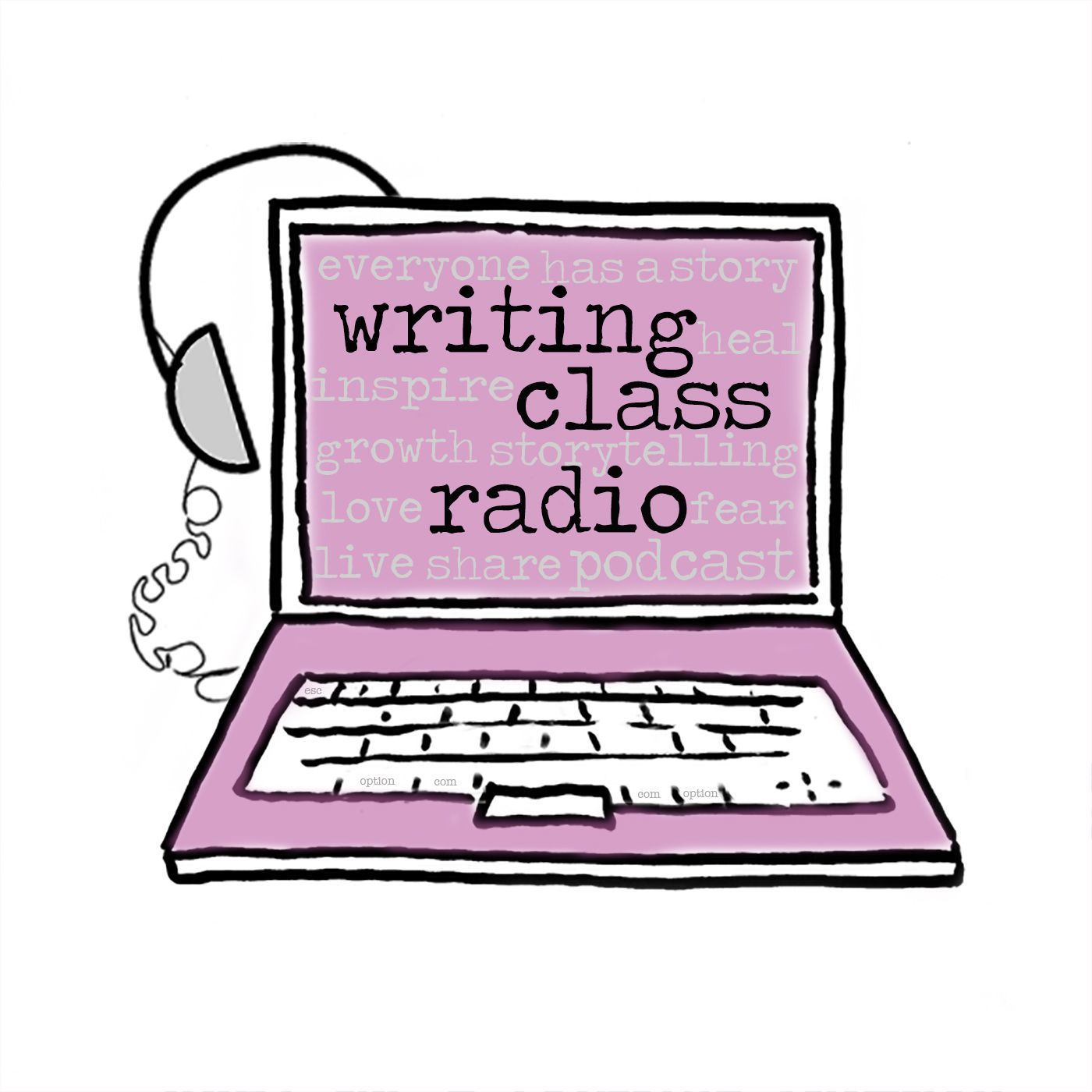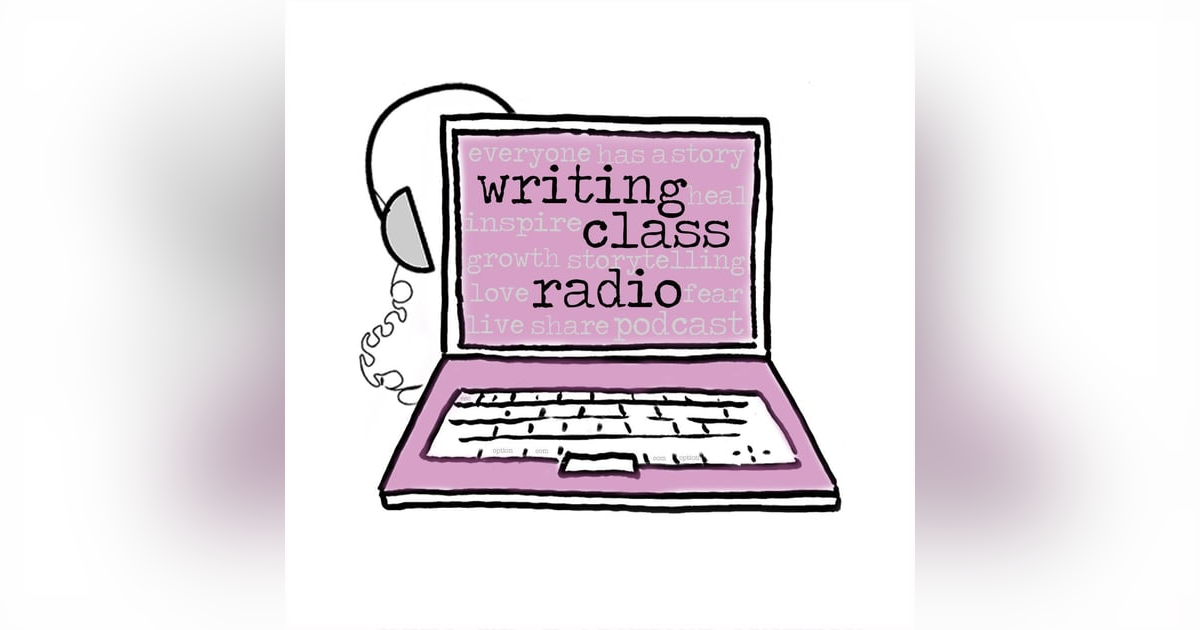
This episode looks at writing as therapy. We look at writing as a way to understand these things we carry: secrets, pain, and shame.
Allison Langer, a student in the class, is the host of this episode. Three new students share their stories. Michelle Massanet tells about a rape that she hid for 22 years and how much lighter she feels since writing about it. Lis Mesa explores getting to the real story she’s been trying to tell all semester and Jennifer Dertouzos finally talks about her brother’s suicide on the last night of class.
Allison came to class to learn the rules of writing and to get better at it but never imagine that writing down all her hidden shit and then sharing it would feel so therapeutic. Listeners will hear questions Allison has been forced to look at in her life. Things like why did she marry a man with addiction problems? Was she trying to save him? Fix him? What does that say about her? She’s also written about the difficult relationship she has with her mom, her ex-boyfriend’s suicide, her pathetic dating life, her children, her wrinkles, and her tits.
Like Allison, many new students eventually write about a trauma they have hidden and carried for way too long. There is an emotional release, and then their writing changes. The shame is lifted. They seem free and their stories roll out.
Brene Brown is someone who has dedicated her life to researching shame and vulnerability. Her TED talks are something we suggest our first time students to listen to or watch because we want them to open up, have the courage to be vulnerable, to be seen, to be honest. Brown says, “We have to talk about shame. Life is about daring greatly.” We think writing the truth is daring greatly and we know from experience that once you’re vulnerable on the page, you feel better in life.
One of our listeners, Loree Schrager is a therapist who told us she refers our podcast to her clients. Allison spent an hour with Loree, milking her for free therapy and talking about why she recommends our podcast to her patients. She said, “When you write things down it helps you make sense of them, and get some perspective. Think about change. See a little bit clearer.” Class can feel like therapy although we comment on the writing, not the trauma, which diffuses the emotion.
Thank you for listening to Writing Class Radio. If you love our show, please tell your friends. If you’d like to participate in one of our workshops, visit our website.
Writing Class Radio is a podcast where you’ll hear true personal stories and learn a little about how to write your own stories. Writing Class Radio is equal parts heart and art. By heart we mean the truth in a story. By art we mean the craft of writing. No matter what’s going on in our lives, writing class is where we tell the truth. It’s where we work out our shit, and figure out who we are. There’s no place in the world like writing class and we want to bring you in.
Writing Class Radio is produced by Diego Saldana-Rojas, Virginia Lora, Allison Langer (www.allisonlanger.com) and Andrea Askowitz (www.andreaaskowitz.com).
Visit our musicians page to learn about the talented and generous people who allowed us to use their songs.
There’s more writing class on our website(www.writingclassradio.com), Facebook (https://www.facebook.com/writingclassradio/) and Twitter (@wrtgclassradio).
If you love the lessons you get on each episode, you can get them ALL in one place--our three-part video series. $20 for one part or $50 for the series. Click on Video Classes on our website.
Writing Class Radio is now open to submissions from our listeners. Go to the submissions page on our website for guidelines. We pay!
If you want to be a part of the movement that helps people better understand each other through storytelling, please go to writingclassradio.com and hit the DONATE button.
There’s no better way to understand ourselves and each other, than by writing and sharing our stories. Everyone has a story. What’s yours? and enjoy our craft talks. There’s no better way to understand ourselves and each other, than by writing and sharing our stories. Everyone has a story. What’s yours?
This episode looks at writing as therapy. We look at writing as a way to understand these things we carry: secrets, pain, and shame.
Allison Langer, a student in the class, is the host of this episode. Three new students share their stories. Michelle Massanet tells about a rape that she hid for 22 years and how much lighter she feels since writing about it. Lis Mesa explores getting to the real story she’s been trying to tell all semester and Jennifer Dertouzos finally talks about her brother’s suicide on the last night of class.
Allison came to class to learn the rules of writing and to get better at it but never imagine that writing down all her hidden shit and then sharing it would feel so therapeutic. Listeners will hear questions Allison has been forced to look at in her life. Things like why did she marry a man with addiction problems? Was she trying to save him? Fix him? What does that say about her? She’s also written about the difficult relationship she has with her mom, her ex-boyfriend’s suicide, her pathetic dating life, her children, her wrinkles, and her tits.
Like Allison, many new students eventually write about a trauma they have hidden and carried for way too long. There is an emotional release, and then their writing changes. The shame is lifted. They seem free and their stories roll out.
Brene Brown is someone who has dedicated her life to researching shame and vulnerability. Her TED talks are something we suggest our first time students to listen to or watch because we want them to open up, have the courage to be vulnerable, to be seen, to be honest. Brown says, “We have to talk about shame. Life is about daring greatly.” We think writing the truth is daring greatly and we know from experience that once you’re vulnerable on the page, you feel better in life.
One of our listeners, Loree Schrager is a therapist who told us she refers our podcast to her clients. Allison spent an hour with Loree, milking her for free therapy and talking about why she recommends our podcast to her patients. She said, “When you write things down it helps you make sense of them, and get some perspective. Think about change. See a little bit clearer.” Class can feel like therapy although we comment on the writing, not the trauma, which diffuses the emotion.
Thank you for listening to Writing Class Radio. If you love our show, please tell your friends. If you’d like to participate in one of our workshops, visit our website.
Writing Class Radio is a podcast where you’ll hear true personal stories and learn a little about how to write your own stories. Writing Class Radio is equal parts heart and art. By heart we mean the truth in a story. By art we mean the craft of writing. No matter what’s going on in our lives, writing class is where we tell the truth. It’s where we work out our shit, and figure out who we are. There’s no place in the world like writing class and we want to bring you in.
Writing Class Radio is produced by Diego Saldana-Rojas, Virginia Lora, Allison Langer (www.allisonlanger.com) and Andrea Askowitz (www.andreaaskowitz.com).
Visit our musicians page to learn about the talented and generous people who allowed us to use their songs.
There’s more writing class on our website(www.writingclassradio.com), Facebook (https://www.facebook.com/writingclassradio/) and Twitter (@wrtgclassradio).
If you love the lessons you get on each episode, you can get them ALL in one place--our three-part video series. $20 for one part or $50 for the series. Click on Video Classes on our website.
Writing Class Radio is now open to submissions from our listeners. Go to the submissions page on our website for guidelines. We pay!
If you want to be a part of the movement that helps people better understand each other through storytelling, please go to writingclassradio.com and hit the DONATE button.
There’s no better way to understand ourselves and each other, than by writing and sharing our stories. Everyone has a story. What’s yours? and enjoy our craft talks. There’s no better way to understand ourselves and each other, than by writing and sharing our stories. Everyone has a story. What’s yours?








